Nature literacy is declining. Many Nova Scotians, particularly youth, lead lives that are increasingly disconnected from nature and the issues that affect our shared wellbeing. Whether because of lack of access, discomfort in new environments or in a setting largely dominated by white settler Canadians, or simply missing knowledge of the opportunities that are out there, isolation from nature carries important consequences for both human health and that of the natural world.
Nature Nova Scotia’s work engaging young people in natural history is rooted in the following understandings:
- We cannot expect Nova Scotians to take action for nature if they haven’t experienced it.
- Developing the values and behaviours that benefit nature conservation first requires some understanding of how natural things, places, and systems work.
- Nature-based learning approaches are key to improving understanding of the natural world but also for fostering the memories and emotional experiences that can turn that understanding into action.
How We’re Connecting Nova Scotians to Nature
We are so excited to announce our new birds- and protected areas-focused education initiative we couldn’t wait until the school year! Starting this August, we’re bringing back our Naturehood program for Nova Scotian youth and families. Naturehood is a program of Nature Canada that connects kids, families, newcomers, and marginalized Canadians to nature. Your “naturehood” is any green space that provides meaningful nature connection, whether it’s a remote wilderness area or a city park.
In recent years, we’ve used Naturehood support to engage informal audiences of campers, families, and new Canadian youth in natural history learning activities, bringing families to provincial and federal protected areas, fostering species ID skills, and engaging young people in nature activism. We’re bringing some of those activities back this year, but we’re also launching a short pilot project – Nature School – which takes a more formal and curriculum-aligned approach to natural history education. Check out our family-friendly event series Birds In Your Naturehood and, for the teachers in our community, read on for how you can sign up for a fully funded field trip to a Nova Scotian National Wildlife Area or Migratory Bird Sanctuary through our pilot program, Nature School!
Connect With Us
Birds In Your Naturehood
Our 2025-2026 Naturehood Program: Birds In Your Naturehood
January 31st, 10:30am – 11:30am: Birds (Owls) In Your Naturehood, Halifax
March 17th, 1:00pm – 3:00pm: (Urban) Birds In Your Naturehood, Halifax
More birdy events coming soon! Check back later!
Looking back on our 2024-2025 Naturehood Program: Turning Young Naturalists Into Activists
Young people are understandably upset about the state of the natural world. In 2024-2025, we helped them find their voice and turn their knowledge into tangible action for nature. Young naturalists from urban and rural communities around Nova Scotia took on citizen science, writing letters to decision makers, and created artwork that shared a wider call to action, thanks to Nature Canada’s support of our 2024-2025 Naturehood program. We are especially grateful to Nature Canada and our friends at Immigrant Services Association of Nova Scotia for helping us engage more BIPOC and new Canadian youth last year. Canadians are just as diverse as our natural history and it’s vital that we close gaps in access for the communities that need it most.
We learned a lot about how young people want to engage with nature and activism in 2024-2025. We engaged over 300 young Nova Scotians in 2024-2025 and are hopeful we’ll be able to apply lessons learned to do more in 2025-2026. Stay tuned for updates on future education and outreach plans as we finalize our new Strategic Plan.
Check out these snapshots from 2024-2025!

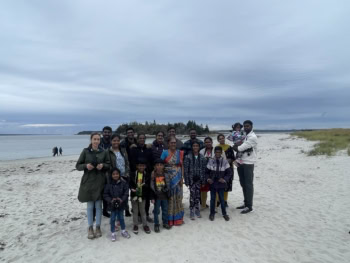
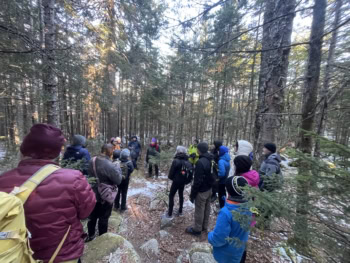


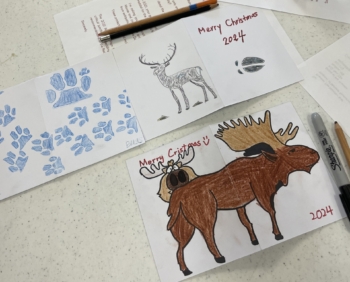
Nature School
We often hear from educators across Nova Scotia who want to bring natural history into their classrooms or get students learning outdoors but aren’t sure where to start. Nature School is our response to that need, a living, evolving initiative shaped by teacher feedback and grounded in locally relevant learning.
Throughout the fall and winter of 2025–2026, we’ve been delivering free, hands-on programs for elementary classes, both in the classroom and outdoors, focused on birds and protected areas in Nova Scotia.
Our programs are available to public, private, and homeschool classes and feature curriculum-aligned activities that explore bird lifecycles, habitats, and conservation.
Our 2025-2026 Nature School programs include:
Grades P-3: Bird Form & Function
Grades 4-6: Bird Habitats & Population Trends
Both programs can be delivered either in-school or on-site, are free of charge, and include facilitation by Nature Nova Scotia staff along with a resource package for teachers. For classes interested in visiting important bird conservation sites, limited funding is available to support travel to a National Wildlife Area or Migratory Bird Sanctuary (up to $300 per class). We’re also happy to help teachers choose a protected area that best fits their class and learning goals.
Our pilot program is currently nearing its conclusion, and as we plan next steps and explore opportunities to continue Nature School through the rest of 2026, we are still welcoming expressions of interest from teachers. Submitting an expression of interest helps us understand demand and will allow us to follow up as program funding and timelines are confirmed.
Sign Me Up for Nature School!
Lesson Plans
Nature learning is stippled throughout Nova Scotia’s public school curriculum but it can be difficult for teachers to make connections across goals and learning outcomes, especially where biodiversity and experiential learning are so often underrepresented. We’ve created a small selection of resources for teachers to use in class (and in the field) to integrate their goals and nature literacy. Some of these are available in print through our current Nature School program, but all educators are welcome to download any of our lesson plans here and use them in your own nature explorations! Have feedback for us? Let our education staff know how we could improve these resources:
- Grades P-3: Birds Form & Function
- Grades 2-5: Waterbirds
- Grades 4-6: Birds Habitats & Population Trends
- Grade 7: The Wabanaki-Acadian Forest
- Grades 7-9: Mainland Moose
Celebration of Nature
Each May, we organize a gathering for naturalists in a symposium program that includes talks, guided outings, and a youth program. We explore protected areas, learn about sustainable management on working lands, and hear about new research, stewardship, and activism initiatives.
In 2025, we went on a coastal adventure with friends at the Cliffs of Fundy Geopark, learning about local geology and wildlife, a youth program delivered by the Young Naturalists Club, and, most importantly, catching up and enjoying some tunes and good food.
Stay tuned for the 2026 Celebration of Nature program!
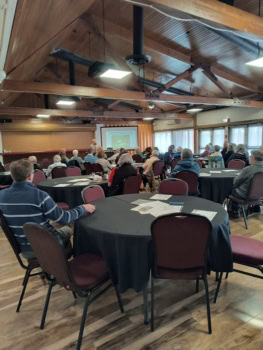
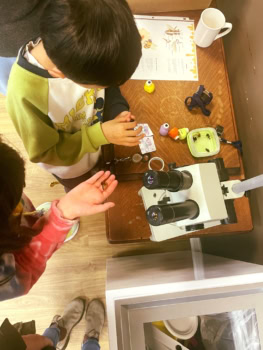
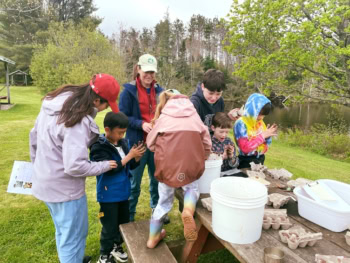
Biodiversity Badge
The Biodiversity Badge is a collaboration between Hike Nova Scotia and Nature Nova Scotia that encourages Nova Scotians to contribute to citizen science while racking up the kilometers! To qualify for the badge, you must complete at least 10 hikes and, for each one, upload 10 or more plant, animal, fungi, or other life observations via iNaturalist.
To apply for your badge, you must report on the areas hiked and provide your iNaturalist username to Hike Nova Scotia to verify your citizen science contribution. Get out there and start logging those hikes!
Check out this blog post from Hike Nova Scotia board member Jonathan Riley describing their journey towards 10 hikes and 100 iNat observations.
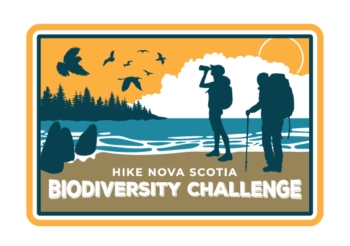
Questions? Have a suggestion for a new learning resource? Looking to connect with a subject expert?
Reach out to education.outreach@naturens.ca
